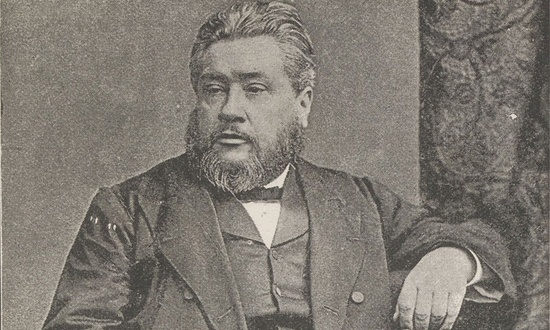During this global pandemic, depression and suicidal thoughts are on the rise. That makes the release of the short book Encouragement for the Depressed, with a sermon from Charles Spurgeon, timely.The book description says,“Having battled depression and discouragement himself for most of his years in ministry, Spurgeon encourages the downtrodden to hold fast to the promises of God, for he is steadfast and will comfort his children as they walk faithfully with him.”
I share in my book Happiness how as a teenager, before knowing God, I had nothing much to fight depression with. Now I have far better tools—first and foremost an awareness of the presence and grace of God. The following is the foreword I wrote for Encouragement for the Depressed, sharing how God has used Spurgeon’s words about depression in my life. If you’re struggling, I pray this helps you. Please don’t suffer alone. Reach out to get prayer and encouragement from trusted friends and if needed, help from medical professionals. (There are medications that help some people, and I’m grateful for that, as they’re part of God’s common grace.)
Hardly anyone outside of Scripture speaks to me like Charles Spurgeon does. He had incredible depth and biblical insight, and his sermons and writings, full of grace and truth and sheer eloquence, always draw me to Jesus.
Spurgeon preached to approximately ten million people in his lifetime, often speaking ten times a week. His 3,561 sermons are bound in sixty-three volumes, and in addition he wrote many books.
Wonderful as those accomplishments were, they put demands on his life that no doubt contributed to his battles with depression—not least of all that he often worked eighteen hours a day!
Spurgeon took great solace in Scripture, especially in the Psalms he loved so much, as evidenced in his massive commentary set The Treasury of David. God’s words, as Spurgeon well knew, are far more valuable than anyone else’s. God promises that his word “shall not return to [him] empty, but it shall accomplish that which [he purposes], and shall succeed in the thing for which [he] sent it” (Isaiah 55:11 ESV). God does not make that promise about your words or my words or even Spurgeon’s words, but only his word. In the face of great criticism, Spurgeon took great pains to conform his preaching and writing to Scripture. We need to hear Spurgeon’s voice because he was faithful to speak God’s word, and today there aren’t nearly enough voices like his.
Spurgeon also serves as a reminder that people of great trust in God can nonetheless be brought low in depression. While that thought may be, well, depressing to those who haven’t experienced depression, it is liberating to those of us who have.
I have known depression at times in my life. Several years ago, for no apparent reason, a cloud of depression descended on me. Day after day, it was my constant companion. During that time, I was encouraged by the perspectives of Spurgeon, whose long-term struggles with depression were far worse than mine. I blogged about my depression and shared a few Spurgeon quotations that can be found in this book.
Many people have since written to tell me their own stories of how God has used Spurgeon’s perspectives on depression in their lives. After I wrote a subsequent blog post about Spurgeon and the suffering he endured, I received this note: “I was depressed because once again I was not feeling well. It’s amazing to realize even great leaders suffered so much. It gives me hope, as I suffer from near constant pain. Thanks. This really encouraged me—I needed it!”
Would Spurgeon have ever guessed that nearly two centuries later his sufferings from depression would be a source of comfort to God’s people? (Who is being, and will be, touched by our sufferings and our perspectives that we won’t know about until eternity?) I am confident that God will use Spurgeon’s words in this little book to encourage many more believers who struggle with depression.
Spurgeon writes, “I have suffered many times from severe sickness and frightful mental depression seeking almost to despair. Almost every year I’ve been laid aside for a season, for flesh and blood cannot bear the strain, at least such flesh and blood as mine. I believe, however, the affliction was necessary to me and has answered salutary ends.”
Those words were written by a man who lived with great physical pain for a large part of his life. While his dear wife, Susanna, was bedridden for decades, Spurgeon contracted smallpox and suffered from gout, rheumatism, and Bright’s disease (inflammation of the kidneys). His health became progressively worse, so that nearly a third of his last twenty-two years were spent away from the pulpit. This physical hardship took a great emotional toll on him.
When Spurgeon was twenty-two years old, a tragedy took place that still haunted him years later. He was preaching for the first time in the Music Hall of the Royal Surrey Gardens because his own church wasn’t large enough. The ten-thousand-person seating capacity was far exceeded by the crowds pressing in. Someone shouted, “Fire!” and though there was no fire, the resulting stampede caused many injuries and the deaths of seven people. Years later, Spurgeon said this horrifying incident took him “near the burning furnace of insanity.”
Still, Spurgeon found that his great suffering drew him closer to God. In an address to ministers and students, he said, “I daresay the greatest earthly blessing that God can give to any of us is health, with the exception of sickness. If some men whom I know of could only be favored with a month of rheumatism, it would, by God’s grace, mellow them marvelously.”
Spurgeon said of pastoral ministry, “Our work, when earnestly undertaken, lays us open to attacks in the direction of depression. Who can bear the weight of souls without sometimes sinking to the dust? Passionate longings after men’s conversion, if not fully satisfied (and when are they?), consume the soul with anxiety and disappointment. To see the hopeful turn aside, the godly grow cold, professors abusing their privileges, and sinners waxing more bold in sin—are not these sights enough to crush us to the earth. . . . How often, on Lord’s Day evenings, do we feel as if life were completely washed out of us! After pouring out our souls over our congregations, we feel like empty earthen pitchers that a child might break.”
He also wrote, “I am afraid that all the grace I have got of my comfortable and easy times and happy hours might almost lie on a penny. But the good I have received from my sorrows and pains and griefs is altogether incalculable. Affliction is . . . the best book in a minister’s library.”
Like the apostle Paul, the often jovial Spurgeon was “sorrowful, yet always rejoicing” (2 Cor. 6:10 ESV). Near the end of his words in Encouragement for the Depressed, Spurgeon says, “Glory be to God for the furnace, the hammer, and the file. Heaven shall be all the fuller of bliss because we have been filled with anguish here below, and earth shall be better tilled because of our training in the school of adversity.”
Thank you, Charles Spurgeon, for your integrity, devotion to God’s word, honest sharing of your own weaknesses, and unquenchable passion for God not just in times of good cheer, but in times of desolate darkness. And thank you, sovereign Lord, for encouraging us through your servant, who, like Abel, though he is dead (while fully alive in your presence), still speaks through his example and life-giving words (Hebrews 11:4).
May God give us ears to hear, and may our hearts be full of hope and expectancy as we await the day when King Jesus, true to His blood-bought promise, will wipe away every tear from our eyes (Revelation 21:4).
Photo by Jan Tinneberg on Unsplash




